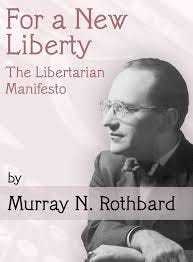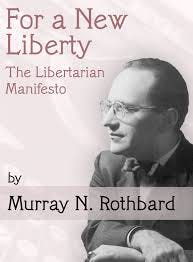
Summary
This chapter, on “Conservation, Ecology, and Growth,” is an early statement of free-market environmentalism. It begins by ridiculing leftists’ decades of contradictory complaints about capitalism: “Stagnation; deficient growth; overaffluence; overpoverty; the intellectual fashions changed like ladies’ hemlines,” and quoting one of Schumpter’s best lines:
Capitalism stands its trial before judges who have the sentence of death in their pockets. They are going to pass it, whatever the defense they may hear; the only success victorious defense can possibly produce is a change in the indictment.
Then Rothbard gets down to business. He defends the benefits of economic growth and technology against radical Greens, and takes a proto-Simonian position on natural resource scarcity. He then explains how private property gives incentives for conservation and discovery. A corollary is that expanding the scope of private property would solve many environmental problems. His chief example is aquaculture:
[I]f anyone tried to farm the sea and to increase the productivity of the fisheries by fertilizers, he would immediately be deprived of the fruits of his efforts because he could not keep other fishermen from rushing in and seizing the fish… Furthermore, there is no economic incentive–in fact, there is every disincentive–for anyone to engage in technological research in the ways and means of improving the productivity of the fisheries, or in extracting the mineral resources of the oceans. There will only be such incentive when property rights in parts of the ocean are as fully allowed as property rights in the land.
Finally, Rothbard turns to pollution. Here he departs from almost every other environmental economist, left and right, by calling for outright bans on air and noise (!) pollution.
The remedy is simply for the courts to return to their function of defending person and property rights against invasion, and therefore to enjoin anyone from injecting pollutants into the air…
The argument that such an injunctive prohibition against pollution would add to the costs of industrial production is as reprehensible as the pre-Civil War argument that the abolition of slavery would add to the costs of growing cotton, and that therefore abolition, however morally correct, was “impractical.”
Rothbard then attacks Friedmanite proposals for pollution taxes or tradable permits, and suggests that technological progress could cope with a total pollution ban:
Mufflers can be installed on noisy machines that emit sound waves precisely contra-cyclical to the waves of the machines, and thereby can cancel out these racking sounds. Air wastes can even now be recaptured as they leave the chimney and be recycled to yield products useful to industry. Thus, sulfur dioxide, a major noxious air pollutant, can be captured and recycled to produce economically valuable sulfuric acid. The highly polluting spark ignition engine will either have to be “cured” by new devices or replaced altogether by such nonpolluting engines as diesel, gas turbine, or steam, or by an electric car.
Critical Comments
There’s a lot to like in this chapter. The opening ridicule is priceless. His early defense of free-market environmentalism and resource optimism are also very good.
The problems arise in the section on pollution. A total ban may sound good, but doesn’t it imply that breathing and speaking are impermissible acts of aggression? After all, you don’t get other people’s consent to emit carbon dioxide on them, or bombard their ears with sound waves.
Rothbard might reply that spraying me with small amounts of carbon dioxide is too minimal to deserve to be called “aggression.” But then couldn’t a polluting factory owner argue the same thing? In the end, both the individual and the factory owner wind up arguing that their emissions are “reasonable,” and there’s no clean way for libertarian principle to adjudicate their claims. Under the circumstances, what’s so awful about e.g. tradable pollution rights?
In Hard Heads, Soft Hearts, Alan Blinder tells us that, “A pollution-free society is unattainable, both physically and economically. To think otherwise is not to think.” In For a New Liberty, Rothbard seems to stubbornly deny Blinder’s truism. It is interesting, then, that Rothbard later wrote “Law, Property Rights, and Air Pollution,” an article that – for practical purposes – completely vitiated his hard-line position.
How so? In this article, Rothbard continues to insist on an absolute right to not be polluted upon, but he also insists upon stringent hurdles to prosecution. A victim is entitled to an injunction against pollution provided that:
(a) the polluter has not previously established a homestead easement; (b) while visible pollutants or noxious odors are per se aggression, in the case of invisible and insensible pollutants the plaintiff must prove actual harm; (c) the burden of proof of such aggression rests upon the plaintiff; (d) the plaintiff must prove strict causality from the actions of the defendant to the victimization of the plaintiff; (e) the plaintiff must prove such causality and aggression beyond a reasonable doubt; and (f) there is no vicarious liability, but only liability for those who actually commit the deed.
Unfortunately, if a million people simultaneously pollute, it will be impossible to prove that any one person caused any one injury, so despite Rothbard’s “ban all pollution” position, people will be able to pollute with impunity.
The lesson I draw: When right and wrong are black and white – and they often are – Rothbard does better than mainstream thinkers. Pollution, however, is an intrinsically gray issue – and when such questions arise, Rothbard winds up awkwardly vacillating between two unsatisfactory extreme positions.
The post appeared first on Econlib.

















As an anarchocapitalist what is your solution? I think it would be the same as Rothbard's: tort (in private arbitration). He just thinks the court would rule that zero pollution is permissable whereas in reality it would be significantly more nuanced.
I'm forever frustrated by the alleged "free market environmentalists" (FMEs), whether Rothbard, Friedman, or others. They assume that pollution's harms are certain and the amount is fixed. Generally, neither is true. Even Coase took too simplistic of an approach by assuming that the externality has to be dealt with all at once. While the parties in Coase's paper may not be able to resolve the problem at once, they may each be able to make small, incremental changes which mitigates the problem over time. Also, the FMEs seem to think of businesses as cartoon like entities that care about nothing other than the bottom line and so don't care about their reputation and the communities around them. And while I'm certain that businesses are strongly focused on the bottom line, such a focus requires having a concern for their reputation and the communities around them. A business can't be successful over time if it's deeply hated. Moreover, pollution is a direct reflection of a less than complete use of inputs and so a business has the profit motive driving it to achieve greater and greater efficiency.